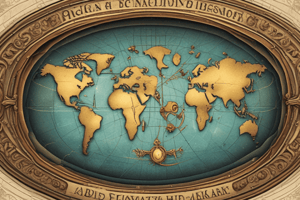Podcast
Questions and Answers
What is the origin of the term 'history'?
What is the origin of the term 'history'?
- Derived from the Greek word 'Istoria', meaning 'inquiry' (correct)
- Derived from the Latin word 'historia'
- Derived from the French word 'histoire', meaning 'story'
- Coined by the ancient Roman historian, Cicero
What is one of the main reasons why history is important?
What is one of the main reasons why history is important?
- To develop a sense of identity (correct)
- To create a literary masterpiece
- To understand the present and future
- To create a sense of tolerance
What is the primary focus of historians in their study of the past?
What is the primary focus of historians in their study of the past?
- The study of the present and its impact on the future
- The study of natural environment and its impact on human society
- The study of the future and its implications on human society
- The study of human society and its interaction with the natural environment (correct)
What is the purpose of studying primary sources?
What is the purpose of studying primary sources?
What is the process of dividing the human past into separate periods called?
What is the process of dividing the human past into separate periods called?
What is the main difference between a historian and a propagandist?
What is the main difference between a historian and a propagandist?
What is the purpose of studying history?
What is the purpose of studying history?
What is the key difference between history and other disciplines?
What is the key difference between history and other disciplines?
What is implied by the concept of 'continuity' in historical studies?
What is implied by the concept of 'continuity' in historical studies?
What is a characteristic of secondary sources?
What is a characteristic of secondary sources?
Flashcards are hidden until you start studying
Study Notes
Introduction to History
- The term "history" comes from the Greek word "Istoria," meaning "inquiry," and was first used by ancient Greek historians like Herodotus (c. 484-425 B.C.E.).
- In everyday usage, history refers to all past events, including those that have not been recorded and those that have been documented by historians.
Nature of History
- History involves the systematic study of the past, including the discovery, collection, organization, and presentation of information.
- Historians select which topics and problems to study from the vast array of past events.
- The primary concern of history is the study of human society and its interaction with the natural environment.
- History is distinct from other disciplines because it focuses on the past, whereas others focus on the present.
Periodization
- Historians divide the human past into separate periods based on significant developments in politics, society, economy, culture, environment, and more.
- History is conventionally divided into ancient, medieval, and modern periods.
Continuity and Change
- History deals with both continuity and change, recognizing that patterns and events can persist over time while also undergoing changes.
- When historians discuss continuities, they do not imply that a particular pattern applied universally or that nothing changed.
Uses of History
- History helps us better understand the present by providing context and insight into past events and their consequences.
- History provides a sense of identity by connecting us to our cultural, social, and national heritage.
- History provides a foundation for other disciplines, such as literature, art, philosophy, religion, sociology, political science, anthropology, and economics.
- History teaches critical skills, including how to find and evaluate sources and make coherent arguments.
- History helps develop tolerance and open-mindedness by exposing us to different perspectives and experiences.
- History is a source of fascination, offering a glimpse into the lives of people in distant ages.
Abuse of History
- History can be abused through deliberate manipulation of the past to fit current political agendas.
- While personal biases are unavoidable, historians must strive to avoid propaganda and present a balanced view of the past.
Sources and Methods of Historical Study
- Historians rely on evidence from sources to support their work, unlike creative writers who rely on imagination.
- Historical sources are classified into primary sources (original, first-hand materials) and secondary sources (published accounts based on primary sources).
- Examples of primary sources include handwritten materials, diaries, letters, photographs, and artifacts.
- Examples of secondary sources include articles, books, textbooks, biographies, and published stories or movies about historical events.
Studying That Suits You
Use AI to generate personalized quizzes and flashcards to suit your learning preferences.



